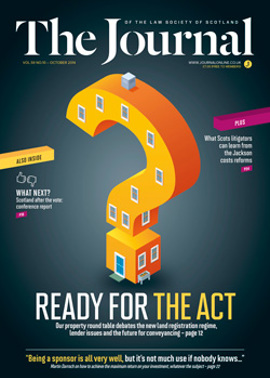President's column

And so the decision is made: Scotland will remain part of the United Kingdom. A clear majority supported the outcome; many others will be disappointed. But all can surely agree that the level of voter engagement and record turnout – including large numbers who registered and voted for the first time – were a triumph for democracy.
That said, it is now time for all of us to come together and find a way forward. During the campaign, we were repeatedly told that a No vote was not necessarily an endorsement of the status quo, with the three main UK parties signing a pledge that extensive new powers would be delivered within a defined timetable. The hard work of achieving consensus now begins. And the broader the consultation and engagement, the more likely that the settlement reached will survive the test of time.
With the country showing the courage to lead the rest of the UK in calling for less centralisation, the Society is also determined to play its part. We worked closely with government and political parties during the process that led to the establishment of the Scottish Parliament, and we stand ready to do so once again. Given the Society’s apolitical, constructive approach during the independence debate, we are well placed to contribute to the Scotland Devolution Commission headed by Lord Smith of Kelvin, and have already offered our assistance.
We have a window of opportunity between now and next year’s general election to develop a roadmap for the way ahead. There is a lot to do in a short time. The voice of the solicitors’ profession, and the clients it serves, must be heard. In doing just that, the Society will stress that discussions should focus on what is best for the people of Scotland, Scots law and our distinct legal system.
Collaborative working
Of course, our relationship with government extends well beyond the constitutional question. Shortly before the referendum, I wrote to the Cabinet Secretary for Justice, Kenny MacAskill, about the refreshed legal aid strategy he intends to publish. As an organisation that is passionate about protecting access to justice and maintaining a sustainable and properly funded system of legal aid, the Society is particularly keen to discuss any plans for the introduction of both contributions and contracting in criminal legal aid.
Undoubtedly, the best solutions for legal aid are found when government, its agencies and the legal profession work constructively and in a spirit of shared understanding. A meeting with the Cabinet Secretary will therefore provide a valuable opportunity to consider the way forward, perhaps including a reassessment of the effectiveness of the Legal Aid Act, which has been stretched and pulled in different directions over the past 30 years.
Other important developments include an agreement to hold regular meetings with the Crown Agent’s executive board, and both the Lord Advocate and Solicitor General. For the justice system to work as effectively and efficiently as possible, particularly during a period of change and modernisation, it is vital that we work together closely on matters of mutual interest.
In pursuing my personal commitment to be accessible, approachable and relevant to members, I have been fortunate to meet colleagues at events around the country in the past month – the Law Awards of Scotland, Glasgow Bar Association Dinner, big firm meeting, Royal Faculty of Procurators in Glasgow, Society of Advocates in Aberdeen and the opening of the Scottish legal year in Edinburgh. Individual issues were raised by a number of members, but it was reassuring that the general feedback suggested the Society was largely in tune with the profession.
For those not aware, the Society’s special general meeting was also held last month. Next year’s annual plan was put to the meeting, which also agreed to freeze the practising certificate fee for the fifth successive year, recognising the continuing demands facing many in the profession. Our flagship Law in Scotland conference – this year focusing on the implications of the referendum vote – has just passed and was a fantastic success, not least because of the decision to combine the Society’s main annual event with that of the In-house Lawyers’ Group for the first time. A great example of collaboration in action.
In this issue
- Respect revived
- Adoption: when should contact continue?
- Family values
- Designs on IP law
- Section 29 claims, time bar and service
- Sharing the rewards
- Reading for pleasure
- Opinion: Lauren Wood
- Book reviews
- Profile
- President's column
- Making the big changeover
- People on the move
- Another leap forward
- LBTT: aligning payment and registration
- The (legal) people have spoken
- Powers of attorney: another angle
- Greatness begins with a pin badge
- Jackson: has it delivered?
- The test for causing alarm
- When do licensed premises "cease to be used"?
- Empowering communities
- Has clawback lost its tax bite?
- Scottish Solicitors Discipline Tribunal
- Property Law Committee Update
- Call it a comeback
- Refereeing the referendum
- Law reform roundup
- From the Brussels office
- What's next for SYLA?
- Mediation first
- When life begins at 60
- With growth there is risk? (2)
- Ask Ash
- Sustainable future: new ideas for the training contract
- Mentoring - why?
- Lender Exchange: what's it about?
- A bar removed






